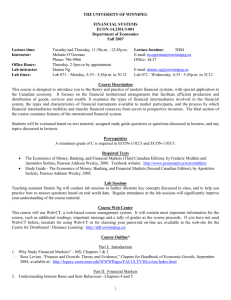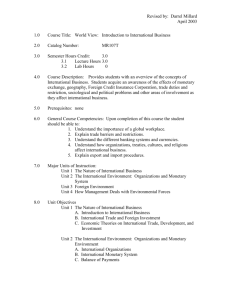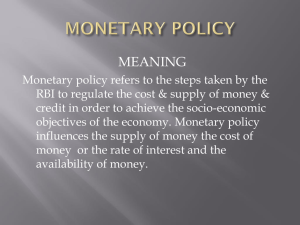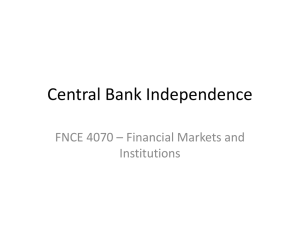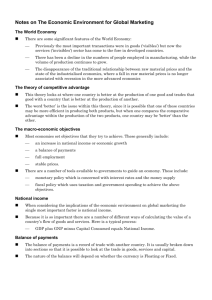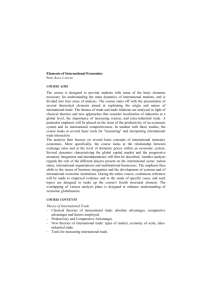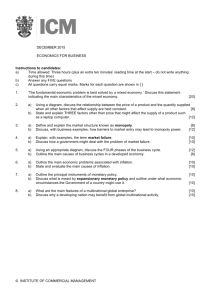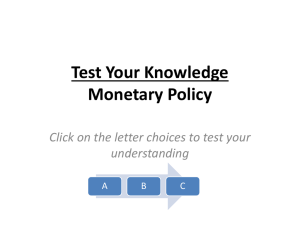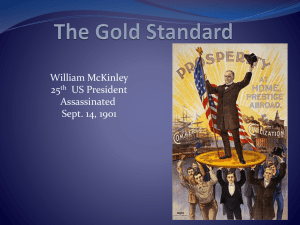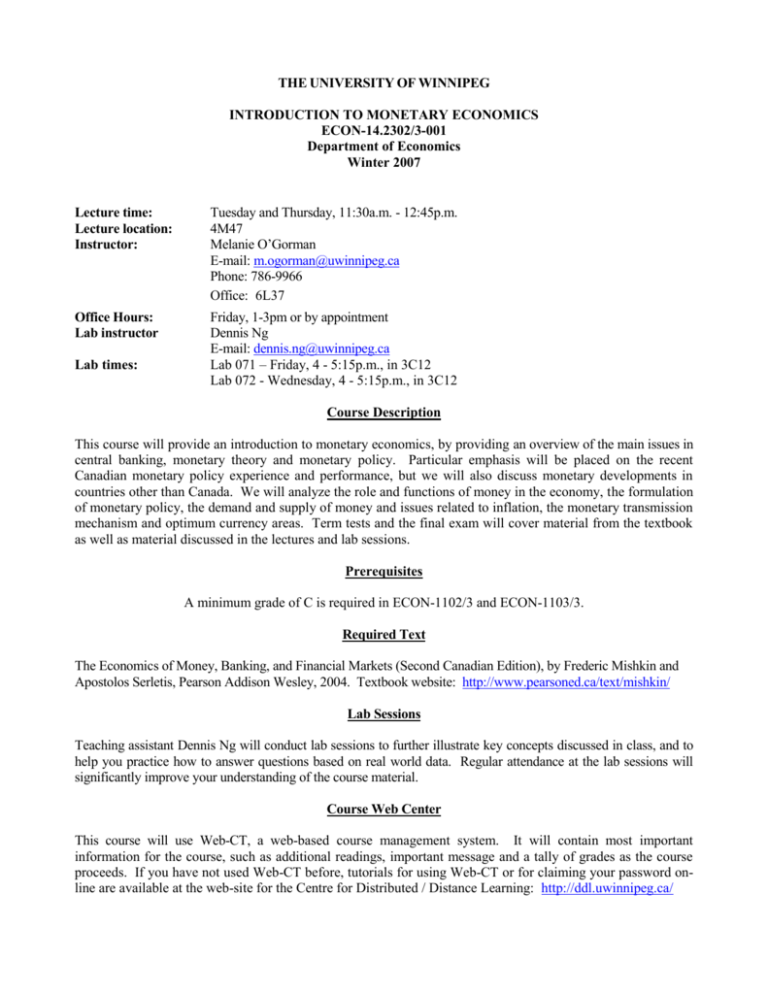
THE UNIVERSITY OF WINNIPEG
INTRODUCTION TO MONETARY ECONOMICS
ECON-14.2302/3-001
Department of Economics
Winter 2007
Lecture time:
Lecture location:
Instructor:
Tuesday and Thursday, 11:30a.m. - 12:45p.m.
4M47
Melanie O’Gorman
E-mail: m.ogorman@uwinnipeg.ca
Phone: 786-9966
Office: 6L37
Office Hours:
Lab instructor
Friday, 1-3pm or by appointment
Dennis Ng
E-mail: dennis.ng@uwinnipeg.ca
Lab 071 – Friday, 4 - 5:15p.m., in 3C12
Lab 072 - Wednesday, 4 - 5:15p.m., in 3C12
Lab times:
Course Description
This course will provide an introduction to monetary economics, by providing an overview of the main issues in
central banking, monetary theory and monetary policy. Particular emphasis will be placed on the recent
Canadian monetary policy experience and performance, but we will also discuss monetary developments in
countries other than Canada. We will analyze the role and functions of money in the economy, the formulation
of monetary policy, the demand and supply of money and issues related to inflation, the monetary transmission
mechanism and optimum currency areas. Term tests and the final exam will cover material from the textbook
as well as material discussed in the lectures and lab sessions.
Prerequisites
A minimum grade of C is required in ECON-1102/3 and ECON-1103/3.
Required Text
The Economics of Money, Banking, and Financial Markets (Second Canadian Edition), by Frederic Mishkin and
Apostolos Serletis, Pearson Addison Wesley, 2004. Textbook website: http://www.pearsoned.ca/text/mishkin/
Lab Sessions
Teaching assistant Dennis Ng will conduct lab sessions to further illustrate key concepts discussed in class, and to
help you practice how to answer questions based on real world data. Regular attendance at the lab sessions will
significantly improve your understanding of the course material.
Course Web Center
This course will use Web-CT, a web-based course management system. It will contain most important
information for the course, such as additional readings, important message and a tally of grades as the course
proceeds. If you have not used Web-CT before, tutorials for using Web-CT or for claiming your password online are available at the web-site for the Centre for Distributed / Distance Learning: http://ddl.uwinnipeg.ca/
Course Outline*
Week 1: What Is Money? (Chapter 3)
Week 2: Structure of Central Banks and the Bank of Canada (Chapter 14)
Week 3: Multiple Deposit Creation and the Money Supply Process (Chapter 15)
Week 4: Determinants of the Money Supply (Chapter 16)
Week 5: Tools of Monetary Policy (Chapter 17)
Term Test 1
Week 6: Conduct of Monetary Policy: Goals and Targets (Chapter 18)
Week 7: Monetary Policy Strategy: The International Experience (Chapter 21)
Week 8: The Demand for Money (Chapter 22)
Week 9: The Keynesian Framework and the ISLM Model (Chapter 23)
Term Test 2
Week 10: Monetary and Fiscal Policy in the ISLM Model (Chapter 24) and Aggregate Demand and Supply
Analysis (Chapter 25)
Week 11: Transmission Mechanisms of Monetary Policy: The Evidence (Chapter 26)
Week 12: Money and Inflation (Chapter 27) and Optimum Currency Areas (online notes)
*Tests will cover all material in assigned chapters, unless otherwise stated.
*Due to time constraints, all topics listed may not be covered
Evaluation
Term test 1 – February 1st, 2007, in class - 30%
Term test 2 – March 1st, 2007, in class - 30%
Final exam – April 13th, 2007, 9a.m. - 40%
Important Notices
Services for Students with Disabilities: Students with documented disabilities requiring academic
accommodations for tests/exams (e.g., private space) or during lectures/laboratories (e.g., access to
volunteer note-takers) are encouraged to contact Shannon Schaus, Coordinator of Disability Services (DS)
at 786-9178 or s.schaus@uwinnipeg.ca, to discuss appropriate options. Specific information about DS is
available on-line at http://www.uwinnipeg.ca/index/services-disability. All information about disability is
confidential.
Final grades are subject to University Senate review.
Students will not be permitted to write make-up tests or hand in assignments late, except for documented
medical or compassionate reasons. Students will lose 15% of the mark for each day after the due date for an
assignment. If a student misses a term test, an official document must be given to the instructor, justifying
the absence, and the weight of that test will be added to the final exam weight. If no documentation is
given, a grade of zero will be awarded.
During tests and final exam, only basic calculators will be permitted (i.e. calculators without any memory).
The last day to withdraw without academic penalty from this course is Friday March 2, 2007
Students should familiarize themselves with the University's policies on plagiarism, cheating, academic
misconduct and appeals – information on these policies is available in Section VII of the University of
Winnipeg General Calendar.
All tests will be closed book tests. Student identification cards may be requested during tests. Paper
dictionaries are permitted during tests for the purposes of translation but they must be examined by the
instructor prior to the test.

